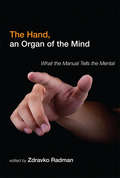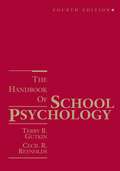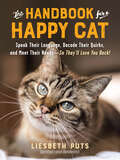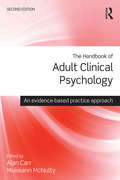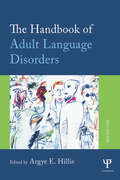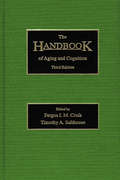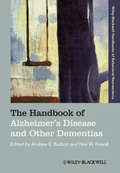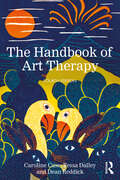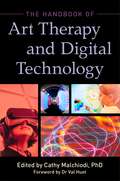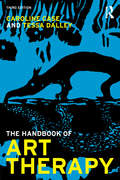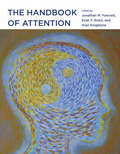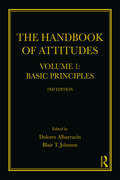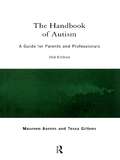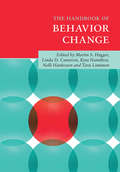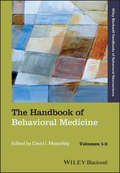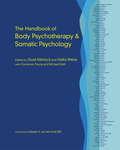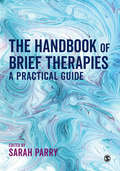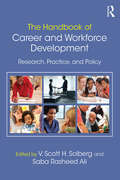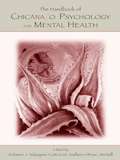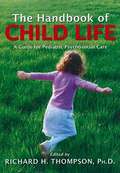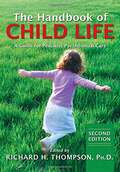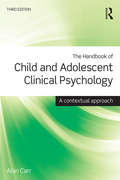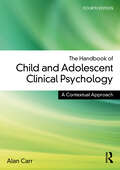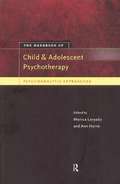- Table View
- List View
The Hand, an Organ of the Mind: What the Manual Tells the Mental
by Zdravko RadmanTheoretical and empirical accounts of the interconnectedness between the manual and the mental suggest that the hand can be understood as a cognitive instrument. Cartesian-inspired dualism enforces a theoretical distinction between the motor and the cognitive and locates the mental exclusively in the head. This collection, focusing on the hand, challenges this dichotomy, offering theoretical and empirical perspectives on the interconnectedness and interdependence of the manual and mental. The contributors explore the possibility that the hand, far from being the merely mechanical executor of preconceived mental plans, possesses its own know-how, enabling "enhanded" beings to navigate the natural, social, and cultural world without engaging propositional thought, consciousness, and deliberation.The contributors consider not only broad philosophical questions—ranging from the nature of embodiment, enaction, and the extended mind to the phenomenology of agency—but also such specific issues as touching, grasping, gesturing, sociality, and simulation. They show that the capacities of the hand include perception (on its own and in association with other modalities), action, (extended) cognition, social interaction, and communication. Taken together, their accounts offer a handbook of cutting-edge research exploring the ways that the manual shapes and reshapes the mental and creates conditions for embodied agents to act in the world.ContributorsMatteo Baccarini, Andrew J. Bremner, Massimiliano L. Cappuccio, Andy Clark, Jonathan Cole, Dorothy Cowie, Natalie Depraz, Rosalyn Driscoll, Harry Farmer, Shaun Gallagher, Nicholas P. Holmes, Daniel D. Hutto, Angelo Maravita, Filip Mattens, Richard Menary, Jesse J. Prinz, Zdravko Radman, Matthew Ratcliffe, Etiennne B. Roesch, Stephen V. Shepherd, Susan A.J. Stuart, Manos Tsakiris, Michael Wheeler
The Handbook Of School Psychology
by Cecil R. Reynolds Terry B. GutkinAs the standard reference in the field, this edited handbook focuses on how a school psychologist can operate and create change within the educational system instead of focusing solely on the diagnosis and treatment of an individual. Chapters have been updated and revised to provide a contemporary view of the field.
The Handbook for a Happy Cat: Speak Their Language, Decode Their Quirks, And Meet Their Needs--so They'll Love You Back!
by Liesbeth PutsGive your best friend more purr and pounce with this whiskers-to-tail guide to the good life! One reason we’re wild for cats is that our cats are still wild at heart. On our laps, they’re purring lovebugs, but on the prowl, they’re fearsome hunters—with territorial instincts to match. The Handbook for a Happy Cat takes us inside the feline mind to decode what our cats really want in life and how they try to tell us. You’ll learn: Why a bigger water bowl does away with “whisker stress” How to move like a mouse for maximum fun at playtime Skills to teach your kitten for a lifetime of easy vet visits, grooming, and more Subtle signs of stress such as excessive scent-marking and lip-licking How to tell frolic from fighting in the multi-cat household (and how to give frenemies a fresh start) What makes a scratching post so tempting that your sofa will be spared How to reassure a spooked cat with the “slow blink” Why it’s pointless to “punish” a cat—but training is possible! Certified behaviorist Liesbeth Puts traces every feline mystery to cats’ natural behavior and needs. A happy cat is a cat who can be herself!
The Handbook of Adult Clinical Psychology: An Evidence Based Practice Approach
by Alan Carr Muireann McNultyThe second edition of the Handbook of Adult Clinical Psychology: An Evidence Based Practice Approach like its predecessor provides clinical psychologists in training with a comprehensive practice handbook to help build the skills necessary to complete a clinical placement in the field of adult mental health. While practical in orientation, the book is based solidly on empirical evidence.Building on the success of the previous edition this handbook has been extensively revised in a number of ways. Throughout the book, the text, references, and website addresses and have been updated to reflect important developments since the publication the first edition. Recent research findings on the epidemiology, aetiology, course, outcome, assessment and treatment of all psychological problems considered in this volume have been incorporated into the text. Account has been taken of changes in the diagnosis and classification of psychological problems reflected in the DSM-5. Chapters on ADHD in adults, emotion focused therapy, radically open dialectical behaviour therapy, and schema therapy have been added. The book is divided into 6 sections: Section 1 covers conceptual frameworks for practice (lifespan development; classification and epidemiology; CBT, psychodynamic, emotion focused, systemic and bio-medical models; and general assessment procedures) Section 2 deals with mood problems (depression, bipolar disorder, suicide risk, and anger management) Section 3 focuses on anxiety problems (social phobia, generalized anxiety disorder, panic disorder, obsessive compulsive disorder, post-traumatic stress disorder and depersonalization disorder) Section 4 deals with psychological problems linked to physical health (health anxiety, somatization, chronic pain, adjustment to cancer, and eating disorders) Section 5 focuses on other significant psychological problems that come to the attention of clinical psychologist in adult mental health services (ADHD in adults, alcohol and other drug problems, psychosis, and psychological problems in older adults) Section 6 contains chapters on therapeutic approaches to psychological distress related to complex childhood trauma (dialectical behaviour therapy for borderline personality disorder, racially open dialectical behaviour for over-controlled presentations, and schema therapy). Each of the chapters on clinical problems explains how to assess and treat the condition in an evidence-based way with reference to case material. Interventions from cognitive-behavioural, psychodynamic, interpersonal/systemic and biomedical approaches are described, where there is evidence that they are effective for the problem in question. Skill building exercises and further reading for psychologists and patients are included at the end of each chapter. This book is one of a set of three volumes which cover the lion’s share of the curriculum for clinical psychologists in training in the UK and Ireland. The other two volumes are the Handbook of Child and Adolescent Clinical Psychology, Third Edition (by Alan Carr) and the Handbook of Intellectual Disability and Clinical Psychology Practice, Second Edition edited by Alan Carr, Christine Linehan, Gary O’Reilly, Patricia Noonan Walsh, & John McEvoy).
The Handbook of Adult Language Disorders
by Argye E. HillisThe Handbook of Adult Language Disorders is the essential guide to the scientific and clinical tenets of aphasia study and treatment. It focuses on how language breaks down after focal brain damage, what patterns of impairment reveal about normal language, and how recovery can be optimally facilitated. It is unique in that it reviews studies from the major disciplines in which aphasia research is conducted—cognitive neuropsychology, linguistics, neurology, neuroimaging, and speech-language pathology—as they apply to each topic of language. For each language domain, there are chapters devoted to theory and models of the language task, the neural basis of the language task (focusing on recent neuroimaging studies) and clinical diagnosis and treatment of impairments in that domain. In addition, there is broad coverage of approaches to investigation and treatment from leading experts, with several authors specializing in two or more disciplines. This second edition focuses on characterizing the cognitive and neural processes that account for each variant of aphasia as a first step toward developing effective rehabilitation, given that aphasia is one of the most common and disabling consequences of stroke. The best and most authoritative handbook in the field, The Handbook of Adult Language Disorders is the definitive reference for clinicians and researchers working in the scientific investigation of aphasia.
The Handbook of Aging and Cognition: Third Edition
by Fergus I. M. Craik Timothy A. SalthouseCognitive aging is a flourishing area of research. A significant amount of new data, a number of new theoretical notions, and many new research issues have been generated in the past ten years. This new edition reviews new findings and theories, enables the reader to assess where the field is today, and evaluates its points of growth. The chapters are organized to run from reviews of current work on neuroimaging, neuropsychology, genetics and the concept of brain reserve, through the 'mainstream' topics of attention, memory, knowledge and language, to a consideration of individual differences and of cognitive aging in a lifespan context. This edition continues to feature the broad range of its predecessors, while also providing critical assessments of current theories and findings.
The Handbook of Alzheimer's Disease and Other Dementias (Blackwell Handbooks of Behavioral Neuroscience #7)
by Andrew E. Budson Neil W. KowallThe reference is a broad-ranging review of Alzheimer's disease and other dementias from both basic and clinical neuroscience perspectives; it provides scientists and medical professionals with an extensive introduction and an up-to-date review of cutting-edge scientific advances. Brings the reader up-to-date with cutting-edge developments in this exciting and fast-paced field Summarizes the most recent developments in the fields of Alzheimer's disease and dementia Brings together articles from a prominent and international group of contributors Encompasses a unique range of topics, combining basic molecular perspectives and cognitive neurosciences
The Handbook of Art Therapy
by Tessa Dalley Caroline Case Dean ReddickThe Handbook of Art Therapy has become the standard introductory text into the theory and practice of art therapy in a variety of settings. The comprehensive book concentrates on the work of art therapists and the way that art and therapy can combine in a treatment setting to promote insight and change. In this fourth edition, readers will gain both a historical overview of art therapy and insight into contemporary settings in which art therapists work, with a new chapter on the use of new technology and working online. The authors are highly experienced in the teaching, supervision and clinical practice of art therapy. Using first-hand accounts from therapists and patients, they look particularly at the role of the art work in the art process and setting in which it takes place. Chapters explore the theoretical background from which art therapy has developed and the implications for practice including the influence of art and psychoanalysis, creativity, aesthetics and symbolism, and the impact of different schools of psychoanalytic theory. Also featured is an extensive bibliography, encompassing a comprehensive coverage of the current literature on art therapy and related subjects. Covering basic theory and practice for clinicians and students at all levels of training, this book remains a key text for art therapists, counsellors, psychotherapists, psychologists and students at all levels, as well as professionals working in other arts therapies.
The Handbook of Art Therapy and Digital Technology
by Rachel Rahman Cathy A Malchiodi Brian Austin Natalie Carlton Bryce Evans Shaun McNiff Christopher Belkofer Kristin Belkofer Alexander Kopytin J. Lauren Johnson Bronwen Gray Alan Young Joe Kavitski Gudrun Jones Molly K. Kometiani Jeffrey Jamerson Olena Darewych Seong-In Kim Donald Cutcher Jedediah Walls Jeff Lohrius Debra Johnson-Fuller Elizabeth Warson Martine Robson Dr Val HuetInterest in the use of digital technology in art therapy has grown significantly in recent years. This book provides an authoritative overview of the applications of digital art therapy with different client groups and considers the implications for practice. Alongside Cathy Malchiodi, the contributors review the pros and cons of introducing digital technology into art therapy, address the potential ethical and professional issues that can arise and give insight into the effect of digital technology on the brain. They cover a wide range of approaches, from therapeutic filmmaking to the use of tablet and smartphone technology in therapy. Detailed case studies bring the practicalities of using digital technology with children, adolescents and adults to life and the use of social media in art therapy practice, networking and community-building is also discussed.
The Handbook of Art Therapy: Third Edition (Supervision In The Arts Therapies Ser.)
by Tessa Dalley Caroline CaseThe Handbook of Art Therapy has become the standard introductory text into the theory and practice of art therapy in a variety of settings. This comprehensive book concentrates on the work of art therapists: what they do, where they practice, and how and why art and therapy can combine to help the search for health and understanding of underlying problems. In this third edition, new developments in the profession are clearly described, including sections on neuroscience, research, private practice and the impact of technology on the therapeutic setting. Caroline Case and Tessa Dalley are highly experienced in the teaching, supervision and clinical practice of art therapy. Using first-hand accounts of the experience of art therapy from therapists and patients, they cover such aspects as the influence of psychodynamic thinking, the role of the image in the art process and the setting in which the art therapist works. The Handbook of Art Therapy also focuses on art therapists themselves, and their practice, background and training. The book includes an extensive bibliography, encompassing a comprehensive coverage of the current literature on art therapy and related subjects, and contains a glossary of psychoanalytic terms. Covering basic theory and practice for clinicians and students at all levels of training, this is a key text for art therapists, counsellors, psychotherapists, psychologists and students at all levels, as well as professionals working in other arts therapies.
The Handbook of Attention (The\mit Press Ser.)
by Jonathan M. FawcettAn authoritative overview of current research on human attention, emphasizing the relation between cognitive phenomena observed in the laboratory and in the real world. Laboratory research on human attention has often been conducted under conditions that bear little resemblance to the complexity of our everyday lives. Although this research has yielded interesting discoveries, few scholars have truly connected these findings to natural experiences. This book bridges the gap between “laboratory and life” by bringing together cutting-edge research using traditional methodologies with research that focuses on attention in everyday contexts. It offers definitive reviews by both established and rising research stars on foundational topics such as visual attention and cognitive control, underrepresented domains such as auditory and temporal attention, and emerging areas of investigation such as mind wandering and embodied attention. The contributors discuss a range of approaches and methodologies, including psychophysics, mental chronometry, stationary and mobile eye-tracking, and electrophysiological and functional brain imaging. Chapters on everyday attention consider such diverse activities as driving, shopping, reading, multitasking, and playing videogames. All chapters present their topics in the same overall format: historical context, current research, the possible integration of laboratory and real-world approaches, future directions, and key and outstanding issues. ContributorsRichard A. Abrams, Lewis Baker, Daphne Bavelier, Virginia Best, Adam B. Blake, Paul W. Burgess, Alan D. Castel, Karen Collins, Mike J. Dixon, Sidney K. D'Mello, Julia Föcker, Charles L. Folk, Tom Foulsham, Jonathan A. Fugelsang, Bradley S. Gibson, Matthias S. Gobel, Davood G. Gozli, Arthur C. Graesser, Peter A. Hancock, Kevin A. Harrigan, Simone G. Heideman, Cristy Ho, Roxane J. Itier, Gustav Kuhn, Michael F. Land, Mallorie Leinenger, Daniel Levin, Steven J. Luck, Gerald Matthews, Daniel Memmert, Stephen Monsell, Meeneley Nazarian, Anna C. Nobre, Andrew M. Olney, Kerri Pickel, Jay Pratt, Keith Rayner, Daniel C. Richardson, Evan F. Risko, Barbara Shinn-Cunningham, Vivian Siu, Jonathan Smallwood, Charles Spence, David Strayer, Pedro Sztybel, Benjamin W. Tatler, Eric T. Taylor, Jeff Templeton, Robert Teszka, Michel Wedel, Blaire J. Weidler, Lisa Wojtowicz, Jeremy M. Wolfe, Geoffrey F. Woodman
The Handbook of Attitudes, Volume 1: 2nd Edition
by Dolores Albarracin Blair T. JohnsonAttitudes are evaluations of people, places, things, and ideas. They help us to navigate through a complex world. They provide guidance for decisions about which products to buy, how to travel to work, or where to go on vacation. They color our perceptions of others. Carefully crafted interventions can change attitudes and behavior. Yet, attitudes, beliefs, and behavior are often formed and changed in casual social exchanges. The mere perception that other people favor something, say, rich people, may be sufficient to make another person favor it. People’s own actions also influence their attitudes, such that they adjust to be more supportive of the actions. People’s belief systems even change to align with and support their preferences, which at its extreme is a form of denial for which people lack awareness. These two volumes provide authoritative, critical surveys of theory and research about attitudes, beliefs, persuasion, and behavior from key authors in these areas. The first volume covers theoretical notions about attitudes, the beliefs and behaviors to which they are linked, and the degree to which they are held outside of awareness. It also discusses motivational and cultural determinants of attitudes, influences of attitudes on behavior, and communication and persuasion. The second volume covers applications to measurement, behavior prediction, and interventions in the areas of cancer, HIV, substance use, diet, and exercise, as well as in politics, intergroup relations, aggression, migrations, advertising, accounting, education, and the environment.
The Handbook of Autism: A Guide for Parents and Professionals
by Maureen Aarons Tessa GittensThis updated edition of the Handbook of Autism explores and expands on the practical and jargon free information of the best-selling first edition. The authors dispel many of the myths surrounding this puzzling and complex disorder. They provide practical information that makes sense, covering both medical and educational issues.Revised research and new case-studies, including follow-ups to the case-studies featured in the first edition reflect the developments made over the last eight years both in the understanding and management of autism. A list of contacts and services at the back of the book underlines its practical approach.
The Handbook of Behavior Change (Cambridge Handbooks in Psychology)
by Linda D. Cameron Martin S. Hagger Kyra Hamilton Nelli Hankonen Taru LintunenSocial problems in many domains including health, education, social relationships, and the workplace have their origins in human behavior. The documented links between behavior and social problems has compelled governments and organizations to explore ways to effectively intervene to promote adaptive behavior change. The Handbook of Behavior Change provides comprehensive coverage of contemporary theory, research, and practice on behavior change. It incorporates evidence-based approaches to behavior change with chapters from leading theorists, researchers, and practitioners from multiple disciplines including psychology, sociology, behavioral science, economics, philosophy, and implementation science. It is the go-to resource for researchers, students, practitioners, and policymakers looking for current knowledge on behavior change and guidance on how to develop effective interventions to change behavior in various contexts.
The Handbook of Behavioral Medicine (Blackwell Handbooks of Behavioral Neuroscience)
by David I. MostofskyHandbook of Behavioral Medicine presents a comprehensive overview of the current use of behavioral science techniques in the prevention, diagnosis, and treatment of various health related disorders. Features contributions from a variety of internationally recognized experts in behavioral medicine and related fields Includes authors from education, social work, and physical therapy Addresses foundational issues in behavioral medicine in Volume 1, including concepts, theories, treatments, doctor/patient relationships, common medical problems, behavioral technologies, assessment, and methodologies Focuses on medical interface in Volume 2, including issues relating to health disorders and specialties; social work, medical sociology, and psychosocial aspects; and topics relating to education and health 2 Volumes
The Handbook of Body Psychotherapy and Somatic Psychology
by Halko Weiss Gustl Marlock Courtenay Young Michael SothThe Handbook of Body Psychotherapy and Somatic Psychology provides a comprehensive overview of body-centered psychotherapies, which stress the centrality of the body to overcoming psychological distress, trauma, and mental illness. Psychologists and therapists are increasingly incorporating these somatic or body-oriented therapies into their practices, making mind-body connections that enable them to provide better care for their clients. Designed as a standard text for somatic psychology courses, The Handbook of Body Psychotherapy and Somatic Psychology contains 100 cutting-edge essays and studies by respected professionals from around the world on such topics as the historical roots of Body Psychotherapy; the role of the body in developmental psychology; the therapeutic relationship in Body Psychotherapy; and much more, as well as helpful case studies and essays on the use of Body Psychotherapy for specific disorders. This anthology will be indispensible for students of clinical and counseling psychology, somatic psychology, and various forms of body-based therapy (including dance and movement therapies), and is also an essential reference work for most practicing psychotherapists, regardless of their therapeutic orientation.Contributors: Gustl Marlock, Halko Weiss, Courtenay Young, Michael Soth, Ulfried Geuter, Judyth O. Weaver, Wolf E. Büntig, Nicholas Bassal, Michael Coster Heller, Heike Langfeld, Dagmar Rellensmann, Don Hanlon Johnson, Christian Gottwald, Andreas Wehowsky, Gregory J. Johanson, David Boadella, Alexander Lowen, Ian J. Grand, Marilyn Morgan, Stanley Keleman, Eugene T. Gendlin, Marion N. Hendricks-Gendlin, Michael Harrer, Ian J. Grand, Marianne Bentzen, Andreas Sartory, George Downing, Andreas Wehowsky, Marti Glenn, Ed Tronick, Bruce Perry, Susan Aposhyan, Mark Ludwig, Ute-Christiane Bräuer, Ron Kurtz, Christine Caldwell, Albert Pesso, Michael Randolph, William F. Cornell, Richard A. Heckler, Gill Westland, Lisbeth Marcher, Erik Jarlnaes, Kirstine Münster, Tilmann Moser, Frank Röhricht, Ulfried Geuter, Norbert Schrauth, Ilse Schmidt-Zimmermann, Peter Geissler, Ebba Boyesen, Peter Freudl, James Kepner, Dawn Bhat, Jacqueline Carleton, Ian Macnaughton, Peter A. Levine, Stanley Keleman, Narelle McKenzie, Jack Lee Rosenberg, Beverly Kitaen Morse, Angela Belz-Knöferl, Lily Anagnostopoulou, William F. Cornell, Guy Tonella, Sasha Dmochowski, Asaf Rolef Ben-Shahar, Jacqueline A. Carleton, Manfred Thielen, Xavier Serrano Hortelano, Pat Ogden, Kekuni Minton, Thomas Harms, Nicole Gäbler, John May, Rob Fisher, Eva R. Reich, Judyth O. Weaver, Barnaby B. Barratt, Sabine Trautmann-Voigt, Wiltrud Krauss-Kogan, Ilana Rubenfeld, Camilla Griggers, Serge K. D. Sulz, Nossrat Peseschkian, Linda H. Krier, Jessica Moore Britt, and Daniel P. Brown.From the Hardcover edition.
The Handbook of Brief Therapies: A practical guide
by Dr Sarah L ParryThis step-by-step guidebook offers a range of contemporary and popular brief treatments, suitable for a range of client groups and professional settings. Following a comprehensive introduction to the use of brief interventions in therapeutic practice, each chapter provides an introduction to the theoretical underpinnings and evidence-based brief intervention, followed by guidance on how to implement the approaches with useful 'top tips', worksheets and examples from practice through case vignettes illustrating its application. Includes chapters on motivational interviewing, brief interventions for suicide risk, brief and single-session exposure-based therapies for phobias and PTSD, solution-focused brief therapy, brief interventions for violence, brief interventions for psychosis and a selection of special interest feature chapters (e.g. supporting people through bereavement and nurturing wellbeing in hospital settings). The Handbook is an essential guide to a range of practitioners working across a multitude of fields within health, social care and education. The Handbook reflects current recommendations and guidelines of the National Institute for Health and Care Excellence and recommendations of accrediting professional bodies in the UK and US. A must have for any practitioner working to support the wellbeing of others.
The Handbook of Brief Therapies: A practical guide
by Sarah ParryThis step-by-step guidebook offers a range of contemporary and popular brief treatments, suitable for a range of client groups and professional settings. Following a comprehensive introduction to the use of brief interventions in therapeutic practice, each chapter provides an introduction to the theoretical underpinnings and evidence-based brief intervention, followed by guidance on how to implement the approaches with useful ′top tips′, worksheets and examples from practice through case vignettes illustrating its application. The Handbook reflects current recommendations and guidelines of the National Institute for Health and Care Excellence and recommendations of accrediting professional bodies in the UK and US. A must have for any practitioner working to support the wellbeing of others.
The Handbook of Career and Workforce Development: Research, Practice, and Policy
by Saba Rasheed Ali V. Scott H. SolbergThe Handbook of Career and Workforce Development provides educators, researchers, and policy makers with information on evidence-based programs and activities. Chapters describe ways that current research can be used to promote the design of more effective career development programs and services at local, state, and national levels. Promising career development practices applicable to a range of settings and special populations are identified, as are strategies for communicating evidence in ways that influence career and workforce development public policy. The Handbook of Career and Workforce Development can be used by policy makers and grant program officers to identify key career development ingredients that should be considered in proposals; researchers seeking to make their career development research relevant and practical; and practitioners implementing or advocating for career development programs and services.
The Handbook of Chicana/o Psychology and Mental Health
by Brian W. McNeill Roberto J. Velásquez Leticia M. ArellanoMexican-Americans now constitute two thirds of what has become the largest and fastest-growing minority group in the United States, Hispanics. They have distinct cultural patterns and values that those who seek to serve them competently as clinicians and educators, and those who attempt to study them, need to understand. This is the first comprehensive overview of the psychology of the Chicana/o experience since 1984. Solidly grounded in the latest theory and research, much of which is relevant to other Latina/o groups as well, The Handbook of Chicana/o Psychology and Mental Health is an indispensable source of up-to-date information and guidance for mental health and education professionals, their trainees and students; and for social and behavioral scientists interested in the impact of cultural differences in multicultural settings.
The Handbook of Child Life: A Guide for Pediatric Psychosocial Care
by Richard H. ThompsonIt has been said that the moral test of a society is how it treats its most vulnerable citizens. Those who enter the field of child life daily encounter those in our society who are among the most vulnerable . . . vulnerable because of their age and their ways of interpreting the world, vulnerable because of their physical circumstances, vulnerable because of the unfamiliar they encounter, vulnerable at times because of additional barriers such as language, poverty or prejudice. Yet, the child life specialist understands that each individual, despite the vulnerabilities he or she may bring to an encounter, also brings strength and resiliency. The task of the child life specialist is to build upon those strengths and to minimize individual vulnerability and maximize the growth of the individual. This book addresses the most important aspects of the practice of child life. The book is geared toward an audience beyond the introductory level and includes information on the state of the art in each chapter covered. Wherever possible, the book demonstrates application of the contents in practice through case studies. The goal of this text is to assist in this process, drawing upon the expertise of leading figures in the field to help provide child life specialists, and other allied health professionals, with the knowledge and skills they will need to accomplish this important task. Book jacket.
The Handbook of Child Life: A Guide for Pediatric Psychosocial Care
by Richard H. ThompsonRevised edition of The handbook of child life, c2009. <p>Child life is a profession that draws on the insights of history, sociology, anthropology and psychology to serve children and families in many critical stress points in their lives, but especially when they are ill, injured or disabled and encounter the hosts of caregivers and institutions that collaborate to make them well. Children and their families can become overwhelmed by the task of understanding and navigating the healthcare environment and continue to face challenges through their daily encounters. It is the job of child life professionals to provide care and guidance in these negotiations to serve as culture brokers, interpreters of the healthcare apparatus to family and child and the child to medical professionals. Despite the best efforts to provide quality, sensitive psychosocial care to children and their families, they remain vulnerable to lingering aftereffects. <p><p>The goal of this revised edition is to help prepare child life specialists to deliver the highest level of care to children and families in the context of these changing realities. Each chapter has been substantially revised and two new chapters have been added. This book will be a valuable resource for not only child life specialists but also nurses, occupational and recreational therapists, social workers and other hospital personnel.
The Handbook of Child and Adolescent Clinical Psychology: A Contextual Approach
by Alan CarrThe third edition of the hugely successful Handbook of Child and Adolescent Clinical Psychology incorporates important advances in the field to provide a reliable and accessible resource for clinical psychologists. Beginning with a set of general conceptual frameworks for practice, the book gives specific guidance on the management of problems commonly encountered in clinical work with children and adolescents drawing on the best practice in the fields of clinical psychology and family therapy. In six sections thorough and comprehensive coverage of the following areas is provided: Frameworks for practice Problems of infancy and early childhood Problems of middle childhood Problems of adolescence Child abuse Adjustment to major life transitions Thoroughly updated throughout, each chapter dealing with specific clinical problems includes cases examples and detailed discussion of diagnosis, classification, epidemiology and clinical features. New material includes the latest advances in: child and adolescent clinical psychology; developmental psychology and developmental psychopathology; assessment and treatment programmes. This book is invaluable as both a reference work for experienced practitioners and as an up-to-date, evidence-based practice manual for clinical psychologists in training. The Handbook of Child and Adolescent Clinical Psychology is one of a set of 3 books published by Routledge which includes The Handbook of Adult Clinical Psychology: An Evidence Based Practice Approach, Second Edition (Edited by Carr & McNulty) and The Handbook of Intellectual Disability and Clinical Psychology Practice (Edited by Alan Carr, Christine Linehan, Gary O’Reilly, Patricia Noonan Walsh and John McEvoy).
The Handbook of Child and Adolescent Clinical Psychology: A Contextual Approach
by Alan CarrNow in its fourth edition, The Handbook of Child and Adolescent Clinical Psychology incorporates important advances in the field to provide a practice- oriented and accessible resource for clinical psychologists in training.Beginning with a set of general conceptual frameworks for practice, the book gives specific guidance on the management of problems commonly encountered in clinical work with children and adolescents, drawing on the best practice in the fields of clinical psychology and family therapy. There is comprehensive coverage of Problems of infancy and early childhood Problems of middle childhood Problems of adolescence Child abuse Adjustment to major life transitions including entering foster care, parental divorce, and bereavement Each chapter dealing with specific clinical problems includes cases examples; discussion of diagnosis, classification, epidemiology, clinical features, assessment, and treatment; and practice exercises. New material includes the latest advances in child and adolescent clinical psychology assessment and treatment programmes and positive psychology. It also is updated in line with the latest revisions of ICD and DSM.This book is invaluable as both a reference work for experienced practitioners and as an up-to-date, evidence- based practice manual for clinical psychologists in training.
The Handbook of Child and Adolescent Psychotherapy: Psychoanalytic Approaches
by Ann Horne Monica LanyadoThis Handbook provides a comprehensive guide to the practice and principles of child and adolescent psychotherapy around the world.Contents include:* a brief introduction to the child psychotherapy profession, its history and development* a review of the theory underlying therapeutic practice* an overview of the varied settings in which child psychotherapists work* analysis of the growth of the profession internationally* an examination of areas of expertise around the world * a summary of current researchContributors are experienced practitioners from within a diverse range of schools and approaches and so provide a well-rounded picture of child and adolescent psychotherapy today. The Handbook of Child and Adolescent Psychotherapy will be an essential resource for professional psychotherapists, students of psychotherapy, social workers and all professionals working with disturbed children.
